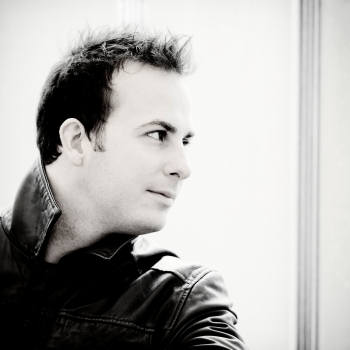Other Links
Editorial Board
-
Editor - Bill Kenny
Founder - Len Mullenger
Google Site Search
SEEN
AND HEARD INTERNATIONAL CONCERT REVIEW
Stravinsky, Prokofiev,
Messiaen, Ravel : Igor Gruppman (violin),
Rotterdam Philharmonic Orchestra , Yannick
Nézet-Séguin (conductor) De
Doelen Concert Hall, Rotterdam 30.11.2008 (BvW)
Stravinsky: L’Oiseau de feu (The Firebird): Suite
no.2 (1910/1919)
Prokofiev: Violin Concerto no.2 in g, op.63
(1935)
Messiaen: Les offrandes oubliées, méditation
symphonique (1930)
Ravel: Ma mère l’oye (Mother Goose) – complete
ballet (1908/1911)

Yannick Nézet-Séguin
This was Yannick Nézet-Séguin’s second program this
month with “his” Rotterdam Philharmonic Orchestra:
the first presented a challenging mix of “Fireworks”:
Handel’s Music for the Royal Fireworks preceded a few
aria’s from Handel operas sung by countertenor
Andreas Scholl and after the break Stravinsky’s
Fireworks (Feu d’artifice) was combined with what in
Yannick’s opinion clearly was the closest thing to
fireworks that Beethoven composed: his Seventh
Symphony.
This week’s program (called Paris: City of the
world) was maybe a bit more traditional in design but
the decision to include a complete performance of
Ravel’s Ma mère l’oye at the end of the concert made
me eager to hear this afternoon’s concert.
L’Oiseau de feu was the first ballet
music Stravinsky wrote for Diaghilev’s Ballets
Russes in Paris. It ’s premiere on the 25th of June
1910 (conducted by Gabriel Pierné!) was an immense
succes and it’s easy to hear why. Stravinsky just
went on were his teacher Rimski-Korsakov (who died in
1908) stopped: the orientalisms of Sheherazade and Le
Coq d’or are also to be found in The Firebird and
even one of the subjects of Rimski’s operas, the evil
wizard Kashchey the Immortal, returns in Stravinsky’s
ballet.
It was this influence of Rimski that Yannick brought
out most in his version of the Suite no.2 (the most
played and most popular). The opening Introduction
sounded definitely French: the orchestra exquisitely
balanced, with an open but very gentle sound.
Noteworthy was the fact that Yannick conducted the
pizzicati in the divisi basses at the start of the
Suite which immediately made the sound of the
orchestra clearer and more precise than the usual
muddy sound in this place…. By lingering over some
beautiful details and ritardandi in The Princesses’
Round Dance the music sometimes lost momentum in
Yannick’s hands but after Kashchey’s Infernal Dance
he didn’t let the tension drop anymore. The Berceuse
and Finale were beautifully paced and balanced and
Yannick made it clear once more that he can excel in
repertoire that seemed to exist in only one version
in Rotterdam (Gergiev’s). In his own way he was
completely convincing. To place this virtuoso piece
first on the program resulted in some “warming-up
accidents” in the orchestra which didn’t distract
very much because the overall conception was
excellent.
Prokofiev’s Second Violin Concerto
(1935) belongs to the end of his “Parisian period”
(it seems that he used sketches from Paris but
orchestrated the concert in Baku) and was premiered
in Madrid in a big cinema-theatre where the composer
invited none other than Arthur Rubinstein to join
him. In his Memoirs Rubinstein writes: “When I
heard the beginning with the fine theme played out
and developed, and the orchestra making it sound
clearly and nobly, I knew I was hearing great
Prokofjev….and then the second subject came in as if
sent from heaven. Even the worst violinist would not
be able to spoil the noble line of this melody. “
This afternoon however we had an excellent
soloist, the orchestra’s concertmaster Igor Gruppman,
who played it with ease and apparent pleasure. The
“once upon a time” opening of the concerto making a
surprising link to the rest of this
fairytale-program.
Yannick found a lot of interesting details in
the accompaniment but kept the orchestra in perfect
balance with the soloist. He reminded me in this way
of the young Simon Rattle, also a conductor who
treats his accompaniments seriously and enjoys to
make music together. (i.e. not the maestro type.)
The part after the break was dedicated to the memory
of one of Yannick’s predecessors as Music Director of
the Rotterdam Philharmonic: Jean Fournet. He died on
the 3rd of November in Hilversum at the age of 95. A
real gentleman and connaisseur of French music his
influence on the Rotterdam Philharmonic was immense.
Messiaen wrote his Offrandes oubliées (The
forgotten offerings) when he was only 21. It’s a
single-movement tryptich with Messiaen’s description
of The Cross, Sin and The Eucharist. From the first
chords Messiaen’s language is clearly recognisable
but only in the third and longest episode (marked:
slow, with great pity and great love) the music
really made an impression. The first violingroup
excelled in this movement.
The performance of Ravel’s complete ballet Ma mère
l’oye proved to be the highlight of this afternoon. I
don’t know who to thank for performing this piece in
its complete form: in this guise it is só much more
than the five small movements that are normally
played and called Suite. All movements are connected
in a marvellous way by Ravel and the delicacy and
inventiveness of this score doesn’t stop to amaze.
Again Yannick showed his total command by
highlighting certain details, relishing every phrase
and he was certainly helped by beautiful soloplaying
from the woodwinds, horns and guest concertmaster
Cécile Huijnen.
To conclude: this was an immensely inspiring and
rewarding concert. It is clear at this point that
Yannick Nézet-Séguin’s relation with his orchestra is
deepening. His body language is already much more
relaxed than it used to be and his conducting much
more effective. At the end of the concert I suddenly
thought: Wow, really, he’s got it! With patience and
a good choice of repertoire this season can prove to
be the start of a very long relationship. And my next
wish? L’Enfant et les sortilèges at the De
Nederlanse Opera.
Bas van Westerop
Back
to Top
Cumulative Index Page
